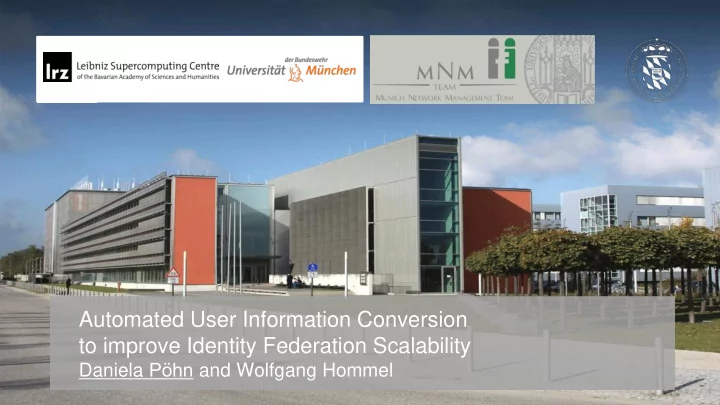

Automated User Information Conversion to improve Identity Federation Scalability Daniela Pöhn and Wolfgang Hommel
Agenda • Introduction and Motivation • Generic Conversion Rule Repository • Functionality • Workflows • Architecture • Example • Conclusion and Outlook 09/06/16 Leibniz Supercomputing Centre 2
Introduction and Motivation 09/06/16 Leibniz Supercomputing Centre 3
Introduction and Motivation • Problem: User information (attribute) missing • Attribute: displayName or cn • Inform organisation • Which attribute? • Update configuration manually • Waiting time 09/06/16 Leibniz Supercomputing Centre 4
Introduction and Motivation Current situation in R&E: • Local Identity & Access Management (I&AM): LDAP or relational database • user information (attributes) • • Federated Identity Management (FIM): Collaborations • SAML • Identity Provider (IDP) • Service Provider (SP) • Signed Metadata, aggregated and pre-shared • Schema: Semantics and syntax attributes • • Inter-Federated Identity Management (IFIM) 09/06/16 Leibniz Supercomputing Centre 5
Introduction and Motivation Federation 3 – Schema 3 Federation 2 – Schema 2 Federation 1 – Schema 1 University C University B Federation University A – Schema A Inter-Federation operator Global Schema Wiki Foodle Moodle SP SP SP Commercial SP IdP 09/06/16 Leibniz Supercomputing Centre 6
Introduction and Motivation Service Providers: • Can state requested attributes in metadata. • Can also send a request. • FriendlyName, Name as OID, NameFormat, and isRequired 09/06/16 Leibniz Supercomputing Centre 7
Introduction and Motivation Identity Provider: Fetch raw user data into IDP software ( DataConnector ) 1. Define attributes ( AttributeDefinition ) 2. Filter attributes ( AttributeFilter ) 3. Send attributes ( AttributeRelease ) 4. 09/06/16 Leibniz Supercomputing Centre 8
Introduction and Motivation Typical conversion rules: • Renaming, e.g., from DateofBirth to schacDateOfBirth , • Merging, e.g., sn and givenName to displayName • Splitting, e.g. cn to givenName • Transforming, e.g., different date formats – dd.mm.yyyy to mm-dd-yyyy 09/06/16 Leibniz Supercomputing Centre 9
Introduction and Motivation • Need to be applied manually by the IDP administrator. • Waiting time for users. • Not scalable • Shibboleth and other FIM software have pre-defined conversion types. • Pre-defined conversion types vary. Generic conversion rule repository Translated into software-specific rules. 09/06/16 Leibniz Supercomputing Centre 10
Generic Conversion Rule Repository - Functionality Shibboleth IDP • Known: available and needed attributes Extension searches for conversion rule Extension TTP Shibboleth • Generic conversion rule at TTP Generic CR API • Adapted for the FIM software SimpleSAMLphp IDP Repos • Locally integrated Extension SimpleSAML- php Specific and generic conversion rules can be re-used Speeding up setup between IDPs and SPs 09/06/16 Leibniz Supercomputing Centre 11
Generic Conversion Rule Repository - Functionality Workflow: Known: IDP attributes and needed SP attributes Extension detects that IDP does not have necessary attributes for SP. 1. Extension queries TTP. 2. a. If generic conversion rule is found, rule is downloaded and transformed. 3. b. Complex conversion rule with scripts is stored IDP software specific and manually downloaded. c. If no conversion rule is found, IDP operator writes new conversion rule. After downloading conversion rule, the generated specific rule is integrated 4. into IDP’s local configuration. User can make use of service without problems. 5. 09/06/16 Leibniz Supercomputing Centre 12
Generic Conversion Rule Repository - Workflow • TTP stores generic conversion rules in database. • Generic rule is downloaded, converted, and inserted into configuration. • If rule is written, it is translated into generic format and uploaded to the TTP. • Specific rules are also stored in database. 09/06/16 Leibniz Supercomputing Centre 13
Generic Conversion Rule Repository - Architecture Database: • ConversionRule : Conversion from one or more attributes into another attribute. • ConversionKeyword : Inserts keywords for specific conversion rules. • ConversionAttribute : Information about source and target attributes for a conversion rule. 09/06/16 Leibniz Supercomputing Centre 14
Generic Conversion Rule Repository - Architecture Generic format of simple conversion rules Shibboleth uses pre-defined operations, e.g.: • Renaming by mapping of attributes. • Splitting and other definitions with regular expressions. • Merging by template attribute definition (Velocity template language). • Scoping by scoped attribute definition. • Principal name by principal name attribute definition. Mapping of different pre-defined operations Generic simple conversion rules 09/06/16 Leibniz Supercomputing Centre 15
Generic Conversion Rule Repository - Architecture Following information needed: • sort of conversion, • source attributes, • target attribute, and • additional information, like regex. Keywords to apply specific conversion rules: source , • target , • targeturn1 , • targeturn2 as well as the transformations • regex respectively pattern and • conversion . • 09/06/16 Leibniz Supercomputing Centre 16
Generic Conversion Rule Repository - Architecture Generic conversion rule: source={source1, source2, ...}; transformation = [renaming, merging, regex, conversion]; target={target, targeturn1, targeturn2}; source(transformation) => target; Renaming: source; transformation = renaming; target={target, targeturn1, targeturn2}; 09/06/16 Leibniz Supercomputing Centre 17
Generic Conversion Rule Repository - Architecture • FIM software specific templates • Keywords filled with values from generic conversion rule repository • Federations can operate such a repository <resolver:AttributeDefinition xsi:type=" Script“ xmlns="urn:mace:shibboleth:2.0:resolver:ad" id=" {{target}} "> <resolver:Dependency ref= "{{source1}} "/> <resolver:Dependency ref=" {{source2}} "/> <resolver:AttributeEncoder xsi:type="SAML1String" xmlns="urn:mace:shibboleth:2.0:attribute:encoder" name=" {{targetUrn1}} " /> <resolver:AttributeEncoder xsi:type="SAML2String" xmlns="urn:mace:shibboleth:2.0:attribute:encoder" name=" {{targetUrn2}} " friendlyName=" {{target}} " /> ... </resolver:AttributeDefinition> 09/06/16 Leibniz Supercomputing Centre 18
Generic Conversion Rule Repository - Example source={ gecos }; transformation = renaming ; target={ displayName , targeturn1, targeturn2}; <resolver:AttributeDefinition xsi:type="Simple" xmlns="urn:mace:shibboleth:2.0:resolver:ad" id=" displayName " sourceAttributeID=" gecos "> <resolver:Dependency ref="{{ source|resource }}" /> <resolver:AttributeEncoder xsi:type="SAML1String" xmlns="urn:mace:shibboleth:2.0:attribute:encoder" name="{{ targeturn1 }}"/> <resolver:AttributeEncoder xsi:type="SAML2String" xmlns="urn:mace:shibboleth:2.0:attribute:encoder" name="{{ targeturn2 }}" friendlyName=" displayName " /> </resolver:AttributeDefinition> 09/06/16 Leibniz Supercomputing Centre 19
Conclusion and Outlook • Generic conversion rule repository improves Shibboleth repository • Improves Proof-of- Concept implementation of GÉANT TrustBroker • Allows re-use of conversion rules • Independent of FIM software • Speeds up IDP-SP setup • Reduces waiting time for users Next steps: • Test concept with different parties • Improve and extend repository • How to generalize scripts or more complex conversion rules? 09/06/16 Leibniz Supercomputing Centre 20
Recommend
More recommend